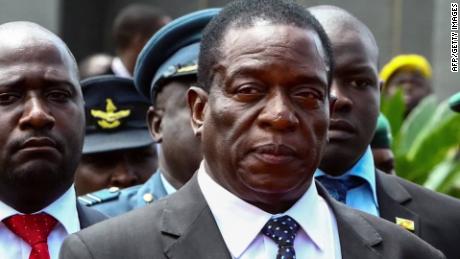Zimbabweans face a bleak 2020 as economic crisis deepens – Tek Portal

Mautsa’s only customer offered to buy a wheelbarrow of sand — a key ingredient in household construction works — at half the asking price. With little choice, he grudgingly agreed to sell at $70 Zimbabwean dollars (US$5 on the local interbank rate).The father of five said his family has been forced to cut down on meals as the price of basic commodities soars thanks to hyperinflation.“It has been a tough year. You simply cannot make enough to make ends meet,” Mautsa told CNN.“On a good day, I make $200 Zimbabwean dollars, but lately business has been going down because the traders are too many. Last year was better, I could even save money for my children’s school fees, but this year inflation has decimated my income.”
Risk of starvation
As well as hyperinflation, Zimbabwe has been hit by severe drought in parts of the country. The UN World Food Programme (WFP) warned on Tuesday that food supplies will run out in early 2020 unless urgent assistance is provided.
“As things stand, we will run out of food by end of February, coinciding with the peak of the hunger season — when needs are at their highest,” said Niels Balzer, the WFP’s deputy country director in Zimbabwe. “Firm pledges are urgently needed as it can take up to three months for funding commitments to become food on people’s tables.”
The WFP announced earlier in the month that $293 million was needed to provide 240,000 tonnes of aid to vulnerable communities in Zimbabwe.
Its director, David Beasley, has appealed to the international community to step up funding to address the root causes of long-term hunger in Zimbabwe.
According to the UN, more than 2.2 million people in urban Zimbabwe and 5.5 million others in rural areas are at risk of starvation due to a drought in the last agriculture season and a prolonged dry spell.
Poor rains have exacerbated the food crisis in the southern African nation which is also grappling with providing drinking water for its citizens.
‘2020 will be worse’
A lack of social safety nets for the poor in urban Harare means many families have had to cut down on the number of meals they can afford to eat each day.
Mautsa said he had to watch his youngest daughter writhe in pain from a suspected case of pneumonia last month, and he could not afford her hospital bills.
The desperate father told CNN he had little choice but to borrow money from a loan shark who charged him extortionate rates of interest to pay her doctor’s fees, priced in US dollars.
“I think 2020 will be worse if the government does not do something to change our situation,” Mautsa said. “We do not need much, just food, a decent home and school fees for our children.”
As things stand, Mautsa said, he cannot afford those things. Adding to the hardship, rentals at his lodgings in the high-density suburbs of Harare are now also priced in US dollars.
Zimbabwe has banned the use of US dollars — preferring the Zimbabwe dollar — but its citizens still quote prices in American currency.
The official interbank market tends to be controlled by the central bank, and mostly does not reflect the currency’s real value, forcing many Zimbabweans to use black market dealers when trading foreign currencies.
Going to bed hungry
At Matagarika Flats in Mbare, Gladys Chihunda, 62, cooks a meal for her four grandchildren. She told CNN that they sometimes go to bed hungry.
“They haven’t eaten since yesterday, so I just bought rice for them. Last night we slept on an empty stomach. One of my grandchildren was returned from school because she was hungry,” Chihunda said.
Nearby, Esther Nyawondo, 35, has borne the brunt of taking care of her three children alone for the past year, after her husband was imprisoned.
“My husband was arrested last year. He is currently serving his six-year sentence. It’s very tough for me, I wish he was here to help me take care of the children,” a teary Nyawondo told CNN.
Other Zimbabweans see leaving the country as the only way out of grinding poverty; millions are estimated to have left in search of better opportunities elsewhere.
‘This country has reduced me to a pauper’
Natasha Munzara, 33, a street hawker who braves the blistering heat to eke out a living shouts herself hoarse attracting customers to her stall, but her meager earnings from selling vegetables and plastic wares are simply not enough to take care of her family.
The mother-of-three said she has been planning to leave Zimbabwe for the past two years, but has faced delays in getting a passport. And — crucially — she hasn’t been able to save enough money to care for her children in her absence.
Munzara said she lost her job as a professional chef at a local hotel last year. She believes finding work as a chef or even a maid in neighboring South Africa is the only way out for her family.
“Things are going up everyday. I rent two rooms and I have to pay US$30, which is way beyond what I earn. My husband is sick and he cannot provide for our family. This country has reduced me to a pauper. I am a…





